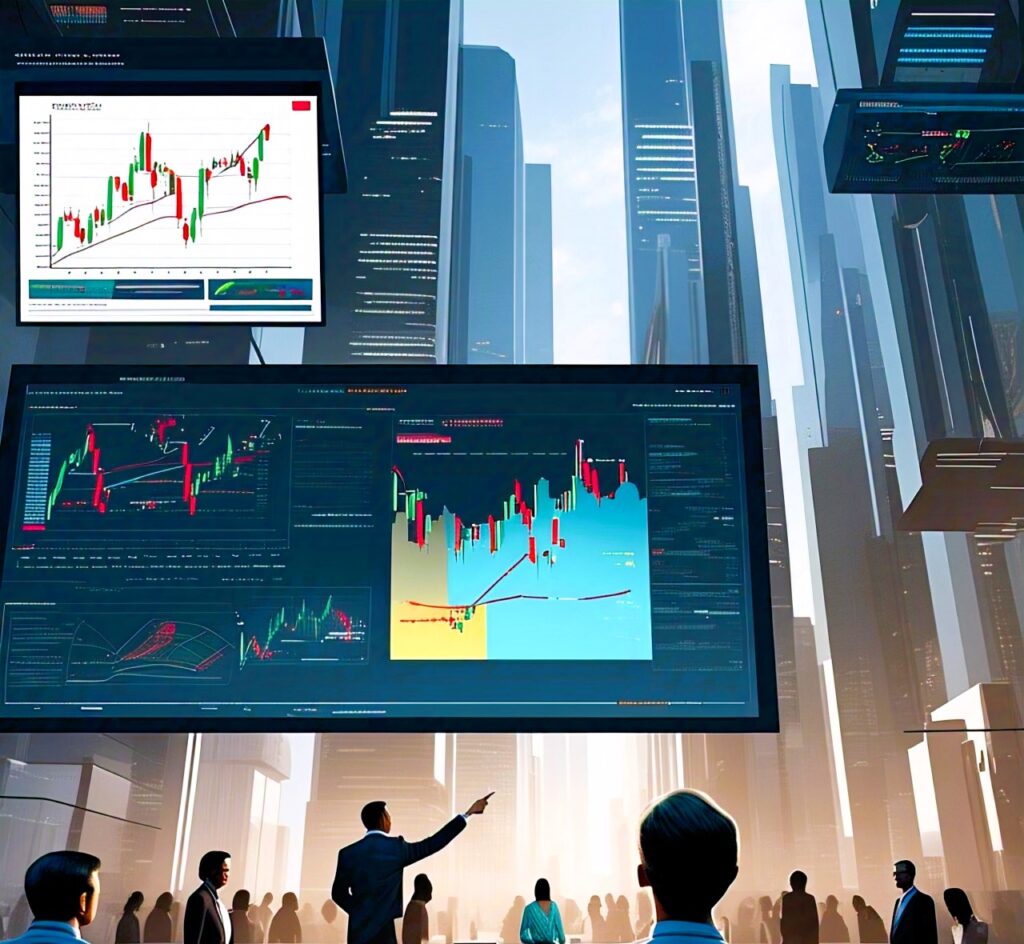The Global Economic Storm: How Trade Wars and Market Crashes Are Shaping the Future
The Global Economic Storm 2025, the world is witnessing a turbulent economic period marked by escalating trade wars, stock market crashes, and geopolitical tensions. These developments are reshaping global economies, threatening stability, and raising questions about the future of international cooperation. This article explores the causes, consequences, and environmental impacts of the Global Economic Storm, the ongoing trade war and the stock market crash, offering insights into how these interconnected crises may unfold.

The 2025 Stock Market Crash: A Historic Downturn
On April 2, 2025, global stock markets began to plummet following President Donald Trump’s announcement of sweeping tariffs on imports from major trading partners. Dubbed “Liberation Day,” these tariffs were part of an aggressive protectionist agenda aimed at reducing the U.S. trade deficit. However, instead of bolstering the economy, they triggered panic selling across global markets.
Trump’s second term: A new front in trade wars
Donald Trump’s first term was marked by a trade war with China, America’s largest trading partner. The tariffs imposed then remain largely intact. In response, some global firms adopted a “China-plus-one” strategy, diversifying production to countries such as Vietnam. What seemed prudent now looks precarious. Mr Trump has vowed to impose additional tariffs: 60% on Chinese goods entering the US and 10-20% on all other imports. If enacted, such measures would severely disrupt global trade and harm the US economy.
Key Highlights of the Crash
Market Losses: The Dow Jones index dropped 4,000 points in just 48 hours—the largest back-to-back loss in its history. Japan’s Nikkei fell nearly 8%, while Canada’s TSX declined by 4.8% in one day[1].
– Volatility Spike: The VIX volatility index doubled, reaching levels comparable to the COVID-19 pandemic crash[1].
– Global Impact: Major indices worldwide suffered their worst week since 2020 due to fears of recession and economic retaliation[4].
This crash is being described as the most significant decline since the Great Recession of 2008. Economists warn that it could surpass previous crises in severity due to its unique combination of factors.

The Global Economic Storm 2025
Escalating Trade Wars: The Catalyst for Economic Turmoil
Trump’s Protectionist Policies
President Trump’s second term has been marked by aggressive trade policies, including heightened tariffs on imports from China, the European Union, and Canada. These measures are intended to protect domestic industries but have instead disrupted global trade flows.
Retaliatory Measures
Countries affected by U.S. tariffs have responded with their countermeasures:
– China: Imposed tariffs on American agricultural products and restricted exports of critical metals[1].
– EU and Canada: Introduced retaliatory tariffs on U.S. goods, further straining relations[1].
These retaliatory actions have created a vicious cycle that mirrors the protectionist policies of the 1930s, which deepened the Great Depression.
Economic Consequences of the Trade War
Global Growth Slowdown
The trade war has raised concerns about a potential global recession:
-Recession Risks: JPMorgan estimates a 60% likelihood of a U.S. recession in 2025 due to reduced trade volumes and higher consumer prices[4].
– Supply Chain Disruptions: Industries reliant on international supply chains, such as technology and automotive manufacturing, face increased production costs and delays[1][4].
Inflationary Pressures
Tariffs act as taxes on imported goods, leading to higher consumer prices:
– U.S. households are facing increased costs for everyday items like electronics and vehicle parts[4].
– Inflation risks are exacerbated by disruptions in global supply chains.
Investor Panic
Uncertainty surrounding trade policies has led to significant volatility in financial markets:
– The S&P 500 dropped nearly 7% over five trading sessions[4].
– High-performing stocks like Nvidia are not immune to sharp declines[2][3].
Environmental Impacts of Trade Wars
While economic consequences dominate discussions about trade wars, their environmental implications are equally important:
Pollution Increase
Tariffs can lead to increased industrial activity in regions with weaker environmental regulations:
– Cities affected by tariffs experience higher levels of air pollution (e.g., sulfur dioxide and particulate matter)[6].
– Water pollution from intensified agricultural practices is also a concern.
Disruption to Sustainability Efforts
Protectionist policies can hinder international cooperation on climate change:
– Tariffs on clean technologies make renewable energy adoption more expensive.
– Reduced collaboration between nations complicates efforts to address environmental challenges.
Deforestation and Land Use Changes
Shifts in agricultural production patterns can result in deforestation:
– Brazil has expanded soybean production to meet Chinese demand, contributing to Amazon rainforest degradation[6].
Geopolitical Tensions Adding Fuel to the Fire
Europe’s Drift from U.S. Leadership
Strained transatlantic relations are weakening economic solidarity:
– NATO tensions and diverging trade policies mirror past failures in international coordination during economic crises[1][4].
– Fragmented markets may lead to competitive currency devaluations akin to interwar gold standard issues.
Middle Eastern Conflicts
Regional instability further complicates global economic recovery:
– Israel’s aggression against Palestinians disrupts Middle Eastern stability, affecting oil prices and inflation.
– Arab nations’ muted responses highlight divisions that weaken collective action against regional crises.
The predicted stock market crash in 2025 is driven by several key factors that have been identified by financial analysts and experts. These factors include:
1. Geopolitical Tensions and Trade Wars
– Trump’s Tariffs: The aggressive trade policies initiated by President Trump, including tariffs on major trading partners like China, Canada, and Mexico, have significantly increased market volatility. These tariffs have led to retaliatory measures from affected countries, exacerbating global economic uncertainty[4][7].
– Global Trade Disruptions: The ongoing trade conflicts disrupt global supply chains, affecting industries reliant on international trade. This can lead to increased production costs and reduced consumer spending[2][4].
2. Economic Indicators and Inflation
– High Inflation: Sustained inflation above the Federal Reserve’s target of 2% is a concern, as it can lead to higher interest rates and reduced consumer spending. This “stayflation” scenario complicates economic stability[6].
– Economic Slowdown: Declining GDP growth, employment rates, and manufacturing output signal economic weakness, which can prompt market sell-offs. Analysts warn of a potential recession due to these factors[2][5].
3. Speculation and Market Valuations
– Overvaluation: High stock valuations, particularly in the U.S., are seen as unsustainable by many experts. This overvaluation increases the risk of a correction or crash if earnings do not meet expectations[1][3].
-Technological Disruptions: Rapid technological advancements, such as the introduction of DeepSeek by China, can disrupt market leaders and cause sudden shifts in investor sentiment[1][3].
4. Consumer Debt and Business Sentiment
– Consumer Debt: Rising consumer debt levels, especially in areas like credit cards and mortgages, reduce consumer spending power and increase the risk of defaults, which can destabilize financial markets[2].
– Business Sentiment: Declining business confidence due to high consumer debt and economic uncertainty can lead to reduced investments and hiring, further weakening the economy[2].
5. Federal Reserve Policies and Interest Rates
– Monetary Policy Challenges: The Federal Reserve faces challenges in balancing inflation control with economic growth. Premature easing or tightening of monetary policies can disrupt market stability[6].
– Interest Rate Volatility: Fluctuations in interest rates can affect borrowing costs and market liquidity, influencing investor decisions and market performance[6].
6. Global Events and Political Uncertainty
– Geopolitical Risks: Conflicts like the Russia-Ukraine war and tensions in the Middle East contribute to market instability by affecting energy prices and global trade[3][5].
– Political Instability: Political uncertainty, including leadership changes and policy shifts, can create market volatility as investors react to potential economic impacts[7].
These factors collectively contribute to the heightened risk of a stock market crash in 2025, as they create an environment of uncertainty and instability that can quickly escalate into broader economic crises.
Lessons from History: Avoiding a Repeat of Past Mistakes
The current situation bears striking similarities to historical events like the Great Depression:
1. Protectionist policies (e.g., Smoot-Hawley Tariff Act) exacerbated economic downturns.
2. Lack of international cooperation deepened the crisis.
3. Geopolitical tensions created additional barriers to recovery.
To avoid repeating these mistakes, governments must prioritize multilateral solutions:
– Revive global trade frameworks like WTO reforms.
– Strengthen international alliances for coordinated economic responses.
– Invest in sustainable practices to mitigate environmental impacts.
Conclusion: Navigating an Uncertain Future
The escalating trade war and stock market crash highlight the interconnectedness of global economies and their vulnerabilities. While history offers valuable lessons for policymakers, addressing today’s challenges requires innovative solutions that balance economic stability with environmental sustainability.
As we move forward into an uncertain future, one thing is clear: cooperation will be key to preventing further turmoil. Whether through diplomatic negotiations or bold policy shifts, nations must work together to weather this storm and build a more resilient global economy for generations to come.
Citations:
[1] https://www.linkedin.com/pulse/stock-market-crash-predictions-2025-what-financial-gurus-saying-jr7dc
[2] https://money.usnews.com/investing/articles/will-the-stock-market-crash-risk-factors
[3] https://www.gripinvest.in/blog/next-stock-market-crash-prediction
[4] https://en.wikipedia.org/wiki/2025_stock_market_crash
[5] https://economictimes.com/markets/stocks/news/will-the-stock-market-crash-in-2025-watch-out-for-these-6-risk-factors/articleshow/116871098.cms
[6] https://www.markets.com/analysis/7-risk-factors-what-will-cause-stock-market-crash-in-2025
[7] https://www.cnn.com/2025/04/07/investing/stock-market-trump-tariffs/index.html
[8] https://www.euronews.com/business/2024/12/25/five-key-factors-analysts-think-could-shape-the-markets-in-2025
[1] https://en.wikipedia.org/wiki/2025_stock_market_crash
[2] https://www.businesstoday.in/markets/top-story/story/economist-warns-of-impending-market-crash-in-2025-expected-to-surpass-2008-crisis-a-look-back-at-timeline-of-2008-market-collapse-433010-2024-06-12
[3] https://www.news18.com/business/economist-warns-of-imminent-stock-market-crash-in-2025-bigger-than-2008-crisis-8928972.html
[4] https://www.businessinsider.com/stock-market-crash-recession-outlook-trump-tariffs-sp500-wall-street-2025-4
[5] https://www.forbes.com/sites/digital-assets/2025/04/04/the-big-market-crash-of-2025-is-underway/
[6] https://www.markets.com/analysis/7-risk-factors-what-will-cause-stock-market-crash-in-2025
[7] https://markets.businessinsider.com/news/stocks/stock-market-crash-recession-economic-depression-bubble-2008-financial-crisis-2024-6
[8] https://www.nerdwallet.com/article/investing/stock-market-outlook
Citations:
[1] https://www.linkedin.com/pulse/stock-market-crash-predictions-2025-what-financial-gurus-saying-jr7dc
[2] https://money.usnews.com/investing/articles/will-the-stock-market-crash-risk-factors
[3] https://www.gripinvest.in/blog/next-stock-market-crash-prediction
[4] https://en.wikipedia.org/wiki/2025_stock_market_crash
[5] https://economictimes.com/markets/stocks/news/will-the-stock-market-crash-in-2025-watch-out-for-these-6-risk-factors/articleshow/116871098.cms
[6] https://www.markets.com/analysis/7-risk-factors-what-will-cause-stock-market-crash-in-2025
[7] https://www.cnn.com/2025/04/07/investing/stock-market-trump-tariffs/index.html
[8] https://www.euronews.com/business/2024/12/25/five-key-factors-analysts-think-could-shape-the-markets-in-2025


